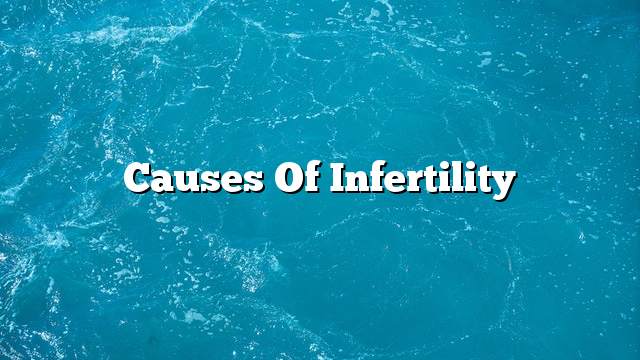Infertility
In the doctors’ dictionary, infertility means that a wife can not conceive after a year of sexual intercourse without the use of contraception, knowing that about 50% of these couples will be able to conceive during the second year automatically without any therapeutic intervention.
Studies show that women’s fertility decreases when they reach their mid-30s. This is due to the lower number and quality of eggs left in the ovaries. For men, age is not considered a major cause of their inability to conceive.
In some cases of infertility there is more than one reason for the inability to have children on both sides, whether in the husband or wife, and in 10% of cases there is no clear reason, and all tests are normal.
Causes of infertility in women
- Occurrence of disorders in ovulation, obstruction or fallopian tubes or diseases in the uterus, these are in 30-50% of cases.
- Ovulation may be caused by age, or as a result of medical conditions related to the functions of several endocrine glands in the body, such as: the condition known as polycystic ovaries, and is treated with hormonal drugs, and sometimes surgical to increase the chances of ovulation.
- The obstruction of the fallopian tubes. This condition usually results from adhesions due to surgery or inflammation in the pelvis, and treatment depends on the extent of damage to the canals, and may be surgically to open channels, or through the use of pipe children.
- Diseases of the uterus are many, including: Congenital malformations, and adhesions within the uterine cavity as a result of inflammation, and depends on the treatment of the nature of the problem.
Causes of infertility in men
- The occurrence of disorders in the male reproductive system, which may lead to the lack of enough sperm or poor quality in form and movement, and these are in 30% of cases.
- Inability to practice intercourse as a result of certain diseases that limit erectile dysfunction and others.
- The presence of varicose veins in the testis, in this case can try to improve the number and quality of sperm with drugs or surgical treatment, and can resort to pipe children as long as there are sperm cells present in the testicle.
Reproductive tests
When should tests be conducted to assess the ability to conceive and reproduce? This is a question many ask and can be answered with the following points:
- If there is irregularity in the menstrual cycle.
- If the wife is in the mid-30s or older, he has been married for 6 months or more.
- If the wife was in his twenties or early thirties, and a year or more went by
- If it is known that the semen analysis of the sperm is abnormal
- If there is an inability to have sexual intercourse.
- If the wife has had previous pelvic surgery, or has had severe pelvic infections.
